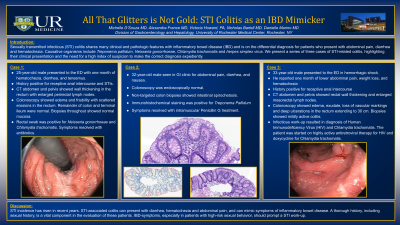Tuesday Poster Session
Category: Colon
P3125 - Sexually Transmitted Infectious Colitis: A Case Series Highlighting an Uncommon Mimicker of Inflammatory Bowel Disease
Tuesday, October 24, 2023
10:30 AM - 4:00 PM PT
Location: Exhibit Hall


Michelle D'Souza, MD
University of Rochester Medical Center
Rochester, NY
Presenting Author(s)
Alexandra France, MD, Michelle D'Souza, MD, Victoria Howard, PA-C, Nicholas Bartell, MD, Danielle Marino, MD
University of Rochester Medical Center, Rochester, NY
Introduction: Sexually transmitted infectious (STI) colitis shares many clinical and pathologic features with inflammatory bowel disease (IBD) and is on the differential diagnosis for patients who present with abdominal pain, diarrhea and hematochezia. Causative organisms include Treponema pallidum, Neisseria gonorrhoeae, Chlamydia trachomatis and herpes simplex virus. We present a series of three cases of STI-related colitis, highlighting their clinical presentation and the need for a high index of suspicion to make the correct diagnosis expediently.
Case Description/Methods: A 25-year-old male presented to the Emergency Department (ED) with one month of hematochezia, diarrhea, and tenesmus. History positive for receptive anal intercourse and STIs. A computed topography (CT) scan of his abdomen and pelvis showed wall thickening in the rectum with enlarged perirectal lymph nodes. Colonoscopy showed edema and friability with scattered erosions in the rectum while the rest of the colon and terminal ileum was normal. Biopsies taken throughout showed normal mucosa. Rectal swab was positive for Neisseria gonorrhoeae and Chlamydia trachomatis. Symptoms resolved with antibiotics.
A 32-year-old male was referred to gastroenterology clinic for abdominal pain, diarrhea, and nausea. A colonoscopy was endoscopically normal. Non-targeted biopsies taken throughout the colon resulted with intestinal spirochetosis. Immunohistochemical staining was positive for Treponema Pallidum and was treated with intramuscular Penicillin G, with resolution of symptoms.
A 33-year-old male with one month of lower abdominal pain, weight loss, and intermittent hematochezia presented to the ED with hemorrhagic shock. CT showed rectal wall thickening and enlarged mesorectal lymph nodes. Colonoscopy showed edema, exudate, loss of vascular markings and deep ulcerations in the rectum extending to 30 cm. Biopsies showed mildly active colitis. Infectious work-up resulted in diagnosis of Human Immunodeficiency Virus (HIV) and Chlamydia trachomatis. The patient was started on highly active antiretroviral therapy for HIV and doxycycline for Chlamydia trachomatis.
Discussion: In recent years STI incidence has risen and the presentation can mimic symptoms of IBD, like
diarrhea and hematochezia. A comprehensive history, including sexual history, is a vital component in the evaluation of these patients. IBD-symptoms, especially in patients with high-risk sexual behavior, should prompt a thorough STI work-up.
Disclosures:
Alexandra France, MD, Michelle D'Souza, MD, Victoria Howard, PA-C, Nicholas Bartell, MD, Danielle Marino, MD. P3125 - Sexually Transmitted Infectious Colitis: A Case Series Highlighting an Uncommon Mimicker of Inflammatory Bowel Disease, ACG 2023 Annual Scientific Meeting Abstracts. Vancouver, BC, Canada: American College of Gastroenterology.
University of Rochester Medical Center, Rochester, NY
Introduction: Sexually transmitted infectious (STI) colitis shares many clinical and pathologic features with inflammatory bowel disease (IBD) and is on the differential diagnosis for patients who present with abdominal pain, diarrhea and hematochezia. Causative organisms include Treponema pallidum, Neisseria gonorrhoeae, Chlamydia trachomatis and herpes simplex virus. We present a series of three cases of STI-related colitis, highlighting their clinical presentation and the need for a high index of suspicion to make the correct diagnosis expediently.
Case Description/Methods: A 25-year-old male presented to the Emergency Department (ED) with one month of hematochezia, diarrhea, and tenesmus. History positive for receptive anal intercourse and STIs. A computed topography (CT) scan of his abdomen and pelvis showed wall thickening in the rectum with enlarged perirectal lymph nodes. Colonoscopy showed edema and friability with scattered erosions in the rectum while the rest of the colon and terminal ileum was normal. Biopsies taken throughout showed normal mucosa. Rectal swab was positive for Neisseria gonorrhoeae and Chlamydia trachomatis. Symptoms resolved with antibiotics.
A 32-year-old male was referred to gastroenterology clinic for abdominal pain, diarrhea, and nausea. A colonoscopy was endoscopically normal. Non-targeted biopsies taken throughout the colon resulted with intestinal spirochetosis. Immunohistochemical staining was positive for Treponema Pallidum and was treated with intramuscular Penicillin G, with resolution of symptoms.
A 33-year-old male with one month of lower abdominal pain, weight loss, and intermittent hematochezia presented to the ED with hemorrhagic shock. CT showed rectal wall thickening and enlarged mesorectal lymph nodes. Colonoscopy showed edema, exudate, loss of vascular markings and deep ulcerations in the rectum extending to 30 cm. Biopsies showed mildly active colitis. Infectious work-up resulted in diagnosis of Human Immunodeficiency Virus (HIV) and Chlamydia trachomatis. The patient was started on highly active antiretroviral therapy for HIV and doxycycline for Chlamydia trachomatis.
Discussion: In recent years STI incidence has risen and the presentation can mimic symptoms of IBD, like
diarrhea and hematochezia. A comprehensive history, including sexual history, is a vital component in the evaluation of these patients. IBD-symptoms, especially in patients with high-risk sexual behavior, should prompt a thorough STI work-up.
Disclosures:
Alexandra France indicated no relevant financial relationships.
Michelle D'Souza indicated no relevant financial relationships.
Victoria Howard indicated no relevant financial relationships.
Nicholas Bartell indicated no relevant financial relationships.
Danielle Marino indicated no relevant financial relationships.
Alexandra France, MD, Michelle D'Souza, MD, Victoria Howard, PA-C, Nicholas Bartell, MD, Danielle Marino, MD. P3125 - Sexually Transmitted Infectious Colitis: A Case Series Highlighting an Uncommon Mimicker of Inflammatory Bowel Disease, ACG 2023 Annual Scientific Meeting Abstracts. Vancouver, BC, Canada: American College of Gastroenterology.

